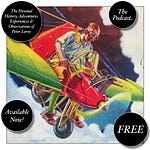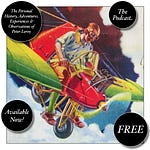Dr. Roberts was my grandfather’s best friend. He was sometimes with my grandfather during those Sundays that he spent on the bay, and Dr. and Mrs. Roberts were part of my grandparents’ “set.” This set consisted mostly of people from families that had been in Babbington for generations. When they were all younger they had dashed about in roadsters and danced together and petted and slept together. More recently, they got together to play cards, talk, drink, and eat meals. They enjoyed a good time; I remember falling asleep to the rumble of their laughter on many Saturday nights when I was spending the weekend with my grandparents.
When Dr. Roberts realized that he couldn’t prevent my grandmother’s death, he began keeping a watchful eye on my grandfather. He was afraid, quite simply, that my grandfather would kill himself after my grandmother’s death. Dr. Roberts had thought it through and had come to the conclusion that when my grandmother was gone what remained in Grandfather’s life would not be enough to make him consider it worth living: not his son, not even his grandson. Dr. Roberts had watched my grandparents help each other through the death of their firstborn son, and he had admired their strength, but he had also seen a weakness in it: each had been strong for the sake of the other, and now he suspected that if there were no other, there would be no reason to be strong, no reason to be at all.
It wasn’t that Dr. Roberts expected anything abrupt and violent from Grandfather, like shooting himself, though there was a small revolver in the house, in a cabinet in the room that had been my father’s bedroom. A stark act of that sort, which would make the aftermath difficult for the rest of us, the sort of thing meant to make the survivors feel that they ought to have given the victim more of themselves somehow and that because they didn’t they are, really, responsible, wasn’t at all my grandfather’s style, but Dr. Roberts could easily imagine Grandfather sailing his little boat out to sea and never returning, leaving ambiguous questions about accident and intention, and he could just as easily imagine Grandfather withdrawing into his house, drinking too much, eating too little, and just slipping away, almost out of wishful thinking.
Dr. Roberts decided that he had to be very direct with Grandfather from the start, very forthcoming, for Grandfather’s own good. If he knew now what was coming and he found a way to live with that knowledge while my grandmother was still there and needed him, perhaps he would find something that would make him want to go on after she was gone. It was worth a try.
So, one evening, shortly after Dr. Roberts had diagnosed Grandmother’s illness as pancreatic cancer, predictably fatal, he sat with my grandfather in the living room, and after a long silence said, “You know that I can tell you now what’s going to happen, don’t you, Jack?”
“I kind of figured,” said my grandfather.
“If you think it would help you, be useful to you, I could run through it, tell you what to expect.”
“I guess you’d better,” said my grandfather.
When I think of my grandfather at this time, even now, so many years later, I think of him as knowing everything, just as I did then, so it is difficult for me to imagine that Dr. Roberts had to tell him anything, but of course he would have had to, because my grandfather really couldn’t have known everything. So, they must have sat in the gathering darkness while Dr. Roberts went through the whole sad sequence: the weight loss, the weakness, “painless jaundice,” the wasting away—pausing while my grandfather replaced their drinks—and then continuing: the loss of appetite, the futility of surgery.
“Can she stay here?” asked Grandfather.
“Yes,” said Dr. Roberts. “There’s no reason why not.” He regretted having added that. “Yes” would have been enough.
Grandfather nodded. Dr. Roberts went on: the spread of the cancer to the liver, hepatic coma, and then—he didn’t say it, but he let his hands drop into his lap and his shoulders fell. He had finished.
There was a long, relieved silence between them. Dr. Roberts was glad to be done, to have done what his conscience told him he ought to do, and to be done with the doing of it. He was exhausted. My grandfather was glad to know. He was a man who liked to know, because at that time he was still among the people who believe that there is always something they can do to make things better, always some way to win the struggle against their sea of troubles, and for those people the terror of the known is always less than the terror of the unknown.
DR. ROBERTS visited Grandmother every week or so, and after he had seen her he would sit with my grandfather, downstairs, in the living room, and commiserate with him. Exactly that: he would sit with my grandfather in the living room—my grandfather on the scratchy wing chair and Dr. Roberts on the scratchy sofa, sinking into the deflated cushions so that he seemed even smaller in comparison to my grandfather than he actually was—and he would pass an hour or so feeling just as miserable as my grandfather felt. They sat in silence most of the time, because each time one of them thought of offering some hope he knew before he spoke that it was false hope, that the other would understand that it was false hope, and that it would wind up diminishing what true hope either of them had. And whenever either of them was about to leap up and pace the room and rail against the injustice of it, to shake his fist at my grandmother’s inevitable future, to fume over the total impossibility of their doing anything to alter it, he caught himself, thought of the effect it would have on the other, and kept silent.
One evening, however, my grandfather cleared his throat and said, “Pain—”
Dr. Roberts said, simply, “Morphine.”
They sat in silence a while longer. Then Dr. Roberts left.
My grandfather tried baking a cherry pie, using cherries from the tree outside the kitchen door. It was a misshapen thing, and sour, but he was hungry, so he ate almost all of it, as his dinner.
[to be continued]
Have you missed an episode or two or several?
You can begin reading at the beginning or you can catch up by visiting the archive or consulting the index to the Topical Guide. The Substack serialization of Little Follies begins here; Herb ’n’ Lorna begins here; Reservations Recommended begins here; Where Do You Stop? begins here; What a Piece of Work I Am begins here.
You can listen to the episodes on the Personal History podcast. Begin at the beginning or scroll through the episodes to find what you’ve missed. The Substack podcast reading of Little Follies begins here; Herb ’n’ Lorna begins here; Reservations Recommended begins here; Where Do You Stop? begins here; What a Piece of Work I Am begins here.
You can listen to “My Mother Takes a Tumble” and “Do Clams Bite?” complete and uninterrupted as audiobooks through YouTube.
You can ensure that you never miss a future issue by getting a free subscription. (You can help support the work by choosing a paid subscription instead.)
At Apple Books you can download free eBooks of Little Follies, Herb ’n’ Lorna, Reservations Recommended, and Where Do You Stop?
You’ll find overviews of the entire work in An Introduction to The Personal History, Adventures, Experiences & Observations of Peter Leroy (a pdf document), The Origin Story (here on substack), Between the Lines (a video, here on Substack), and at Encyclopedia.com.














Share this post